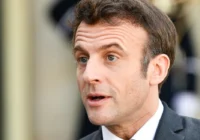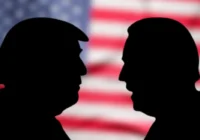This is Fair Observer’s new feature offering a review of the way language is used, sometimes for devious purposes, in the news. Click here to read the previous edition.
We invite readers to join us by submitting their suggestions of words and expressions that deserve exploring, with or without original commentary. To submit a citation from the news and/or provide your own short commentary, send us an email.
March 4: Tragic
Even though he hesitated until the last minute to make it official on Thursday, everyone in France knew that their president, Emmanuel Macron, would be up for reelection in a contest whose first round will take place on April 10, followed by the second-round runoff on April 24.
The strategic delay in his decision-making has been officially explained by the combination of the ongoing COVID-19 crisis and the much more recent Russian invasion of Ukraine, a dossier for which Macron has been very active in recent months. The race is very difficult to call given the range of opponents, but Macron is favored to win the first round. Though it’s anyone’s guess how the second round may play out or even who the opposing candidate is likely to be.
How Coherent Is NATO Today and in the Future?
With the Ukraine crisis dominating the headlines, Macron stepped up this week, almost at the same time as US President Joe Biden’s State of the Union address, to give a rousing speech with a similar theme, insisting on solidarity with the Ukrainians and the defense of democracy. But unlike his American counterpart, whose speech read like a celebration of his administration’s and his nation’s moral commitment to the Ukrainian cause, Macron went a bit further, invoking the “tragic” dimension of the current situation with these words: “To this brutal return of tragedy in history, we owe it to ourselves to respond with historic decisions.” He added the idea that “Europe has entered a new era” and hinted that it would be an era defined in terms of “energy independence” and “European defense.”
Macron’s vision of a different future may be interpreted more as a campaign promise than a realistic forecast of how European identity will evolve in the future. But it is a theme that Macron has heavily invested in, an idea he has been promoting for a long time. Despite past failure to move the needle, he may be onto something this time concerning the future of Europe’s security policies, which are as much under attack as Kyiv itself.
The crisis in Ukraine reveals not only the threat Russia potentially represents for some European nations, but also the risk associated with Europe’s dependence on Russia’s natural gas. Even more significantly — though discussion of this topic must wait for some sort of resolution to the Ukrainian drama — the crisis has revealed the troubling degree to which European countries have become the hostages of the monster known as NATO.
The calling into question of NATO may sound paradoxical at the very moment when every country in the prosperous West has expressed its heartfelt solidarity with Ukraine and its bitter condemnation of Russia’s invasion. Many commentators have waxed lyrical about the “unification” of Europe in opposition to Russia and see this as a prelude to the reinforcement of NATO. That is possible, but at this early stage in the conflict, it sounds like a hasty conclusion.
Macron is hinting at a world beyond NATO. He is certainly right to assume that he isn’t the only European leader who, without complaining too loudly, is privately assessing Washington’s responsibility in the conflict. After all, the US is the nation that, despite France and Germany’s resistance, drew the red line defending the iron-clad principle of Ukraine’s inalienable right to join NATO.
Macron’s position should help his chances in the coming election. He cannot be accused of electoral opportunism as he has proved himself consistent and sincere in his mission to redefine Europe’s security in European rather than North Atlantic terms. It hasn’t worked yet despite his and, to some extent, Germany’s previous efforts, but that predictable disappointment occurred before the tragedy that is now engulfing Europe. When the dust settles on the Russia-Ukraine crisis, all Europeans (and maybe even the UK’s Boris Johnson) will begin parsing the complex lessons produced by a terribly mismanaged fiasco that is still ongoing and shows some signs of possibly leading to a nuclear conflagration.
For the moment, the Americans have presented the Russian assault as a combat between good and evil. Europe and its media have, in their very real but to some extent staged outrage, followed suit. But at some point in the near future, Europeans will sit down and attempt to assess not just the winners and losers as the US tends to do, but the volume of evil that is attributable to both sides. European cultures tend to be far less binary and Manichean than US culture, which has demonstrated in this crisis its inimitable capacity to discard the kind of nuance that can, at least on some occasions, actually prevent or at least forestall tragedy.
The idea of tragedy, understood to be a noble art form, is taken seriously in France, a nation that produced two famous authors of tragedy, Corneille and Racine. Apart from a brief episode in the 18th century (partly due to jealousy), France has always admired Shakespeare and Schiller. The French know that authentic tragedy is never about the battle between good and evil. The literary genre that exploits that kind of binary logic is called melodrama. Tragedy always contains something corresponding to Aristotle’s intuition of its being built around the notion of a tragic flaw.
In his analysis of Oedipus Rex, Aristotle attributed the flaw to the tragic hero, seen as admirable and good, but affected by something that undermines his good fortune. But the flaw may also exist in the system and its rules, in the government or the culture of the play, in the environment in which tragic heroes and heroines are permitted to act. As one famous tragic hero noted, there may be “something rotten in the state of Denmark,” something that to which the tragedy itself is drawing the audience’s attention.
When he characterizes the Ukraine conflict as a tragedy, Emmanuel Macron, like other Europeans familiar with the history of the past century, is thinking not so much of the literary tradition as the devastating wars that have taken place on the continent’s soil. This is a privilege not equally available to Americans, whose only lasting memory of war on their own soil is that of a civil war that happened over 150 years ago.
The idea of history Americans learn at school and through the media, even in the case of their own civil war, is always about a struggle between good and evil. Slavery defined the South as evil, despite the fact that Southerners were true Americans. Because all conflicts are framed as a combat between good and evil, Americans are encouraged to think of their nation as a “force for good.” America is exceptional and has been called the “indispensable nation.” Many attribute to the French leader Charles de Gaulle the reflection that “the graveyard is full of indispensable people.” History too is full of indispensable nations and even empires.
Today, everyone in Europe perceives the Ukraine situation as a worrying tragedy that is still building toward its most destructive climax. But for Macron, whose reelection is far from assured within the chaotic political environment that currently reigns in France, it may turn out to be a serendipitous tragedy. It may turn out to be the moment of enlightenment in which his dream of a Europe no longer tethered to the United States may define and implement its own security system. As he begins to hone his official reelection campaign, Macron can pursue that goal and, at the same time, hope that it will convince his electors that he’s the one who can carry it out.
Why Monitoring Language Is Important
Language allows people to express thoughts, theories, ideas, experiences and opinions. But even while doing so, it also serves to obscure what is essential for understanding the complex nature of reality. When people use language to hide essential meaning, it is not only because they cynically seek to prevaricate or spread misinformation. It is because they strive to tell the part or the angle of the story that correlates with their needs and interests.
In the age of social media, many of our institutions and pundits proclaim their intent to root out “misinformation.” But often, in so doing, they are literally seeking to miss information.
Is there a solution? It will never be perfect, but critical thinking begins by being attentive to two things: the full context of any issue we are trying to understand and the operation of language itself. In our schools, we are taught to read and write, but, unless we bring rhetoric back into the standard curriculum, we are never taught how the power of language to both convey and distort the truth functions. There is a largely unconscious but observable historical reason for that negligence. Teaching establishments and cultural authorities fear the power of linguistic critique may be used against their authority.
Remember, Fair Observer’s Language and the News seeks to sensitize our readers to the importance of digging deeper when assimilating the wisdom of our authorities, pundits and the media that transmit their knowledge and wisdom.
The views expressed in this article are the author’s own and do not necessarily reflect Fair Observer’s editorial policy.
Support Fair Observer
We rely on your support for our independence, diversity and quality.
For more than 10 years, Fair Observer has been free, fair and independent. No billionaire owns us, no advertisers control us. We are a reader-supported nonprofit. Unlike many other publications, we keep our content free for readers regardless of where they live or whether they can afford to pay. We have no paywalls and no ads.
In the post-truth era of fake news, echo chambers and filter bubbles, we publish a plurality of perspectives from around the world. Anyone can publish with us, but everyone goes through a rigorous editorial process. So, you get fact-checked, well-reasoned content instead of noise.
We publish 2,500+ voices from 90+ countries. We also conduct education and training programs
on subjects ranging from digital media and journalism to writing and critical thinking. This
doesn’t come cheap. Servers, editors, trainers and web developers cost
money.
Please consider supporting us on a regular basis as a recurring donor or a
sustaining member.
Will you support FO’s journalism?
We rely on your support for our independence, diversity and quality.







